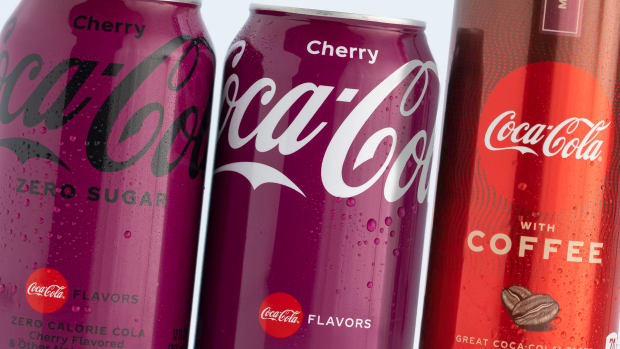Coca-Cola (KO) has, over the years, released a ton of products — while older people will remember New Coke and Tab Clear, recent memory brings back images of energy drinks and Coca-Cola Lite.
While versions like Vanilla and Black Cherry Coke have a dedicated base of fans, certain products have been decidedly less successful: meant to be an even sweeter version of the original, the New Coke sparked protests and petitions that led the company to withdraw it in 1985.
What's Coca-Cola with Coffee Mocha All About?
Almost 40 years later, the company is experimenting with another new flavor: Coca-Cola with Coffee Mocha. Coming to store shelves on February 7, the new beverage supposedly "sips like a Coke and finishes like a coffee."
With 69 milligrams of caffeine, each 12-oz. can has hints of Brazilian coffee, chocolate and Coca-Cola all at once.
"Because we know that while there’s nothing better than a 3 p.m. ice-cold Coke, we are competing with coffee during these break moments," Brandan Strickland, brand director of the Coca‑Cola Trademark, said in a statement. "We believe Coca‑Cola with Coffee is the perfect choice for those who want the uplifting and refreshing taste of a Coke with the familiar flavor of coffee."
Coca-Cola first started selling coffee products in January 2021 — mocha joins the dark blend, vanilla and caramel options. To announce the news, Coca-Cola sent out a string of drink and coffee emojis on Twitter (TWTR) before officially announcing the news.
It also recently revamped the design of flavored Coca-Cola to associate products with certain colors: one color means a single flavor like cherry or vanilla, while a stacked colors means a blend like cherry-vanilla. Different-colored scripts are meant to indicate whether a product is sugar- or caffeine-free.
Do Customers Buy Coffee Coke?
To get customers excited about the new launches, Coca-Cola will be sending those who submit their address online an early can of Coca-Cola with Coffee Mocha or Cherry Coke and Cherry Coke Zero Sugar through a contactless delivery done by robot. You do, however, have to live in the United States.
While it has experimented with dozens of products over the decades, classic ones like Coca-Cola and Diet Coke remain the company's core products — the classic sugared version remains the world's most-bought carbonated beverage in 2021.

Coca-Cola
Seen by some as attempts to generate attention around the brand, new launches rarely gain widespread adoption — 18 months after introducing an energy-drink line in the U.S. and Canada, the company dropped it on account of weak sales.
With the ready-to-drink coffee market worth $22.44 billion in 2019 and projected to be at $42.36 billion by 2027, canned coffee-cola drinks may be a better investment for the company — only time will show whether this type of product will remain a Coca-Cola mainstay.
"We set out to grow occasions for the Coke brand during the mid-afternoon lull when we want a pick-me-up," Strickland said.







